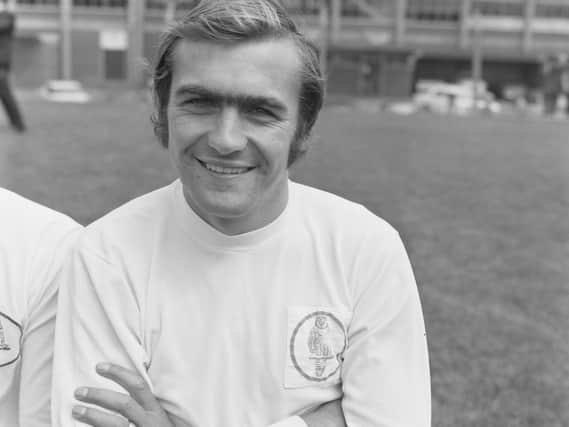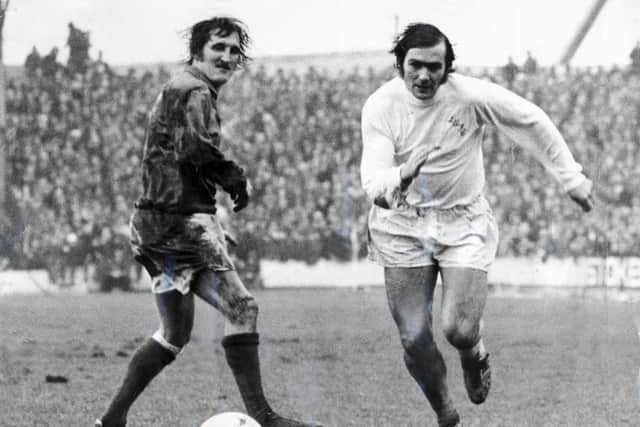Terry Cooper obituary: From rugby league roots to football stardom for Leeds United and England


Born in Brotherton, Cooper used to be a regular in the stands at either Castleford or Featherstone along with the rest of his family as a child.
But the young Yorkshireman always dreamed of being a footballer and was eventually handed that chance by Leeds under legendary boss Don Revie.
Advertisement
Hide AdAdvertisement
Hide AdThere was nothing legendary about Revie or Leeds when Cooper first arrived at the club on trial having been spotted playing for Ferrybridge Amateurs in 1961.


The Whites were loitering in the old second division and definitely not the attractive proposition that they are today.
“For some reason I always wanted to be a footballer, even though I didn’t really have any heroes or role models - and certainly not at Leeds,” said Cooper back in June 2000 in the edition of Leeds Leeds Leeds.
“They weren’t big at all where we were from and as it took over an hour-and-a-half on the bus by the time you’d gone through all the villages, not many could be bothered to make the effort to get up there.”
Advertisement
Hide AdAdvertisement
Hide AdBut nine years after making that effort as part of his initial trial, Cooper was representing England at the 1970 World Cup in Mexico with his club now the country’s dominant force.
By then, Cooper had become Revie’s left back as part of a side that had scooped four major honours in the last three years.
Initially signed as a left winger, Cooper had scored the only goal of the game as Revie’s Whites bagged their first major honour by beating Arsenal 1-0 in the 1968 League Cup final.
The first of two Inter Cities Fairs Cup triumphs and the followed the same season, after which Leeds became champions of England for the very first time and then won the Charity Shield.
Advertisement
Hide AdAdvertisement
Hide AdCooper’s brilliant displays took him to the England team as part of a career that would go on to feature 20 caps for the Three Lions.
There would have been substantially more appearances for both club and country had Cooper not broken his leg in 1972 which led to 20 months out.
Even so, the defender amassed 351 appearances for the Whites, netting 11 goals including his most famous strike in the League Cup final against Arsenal.
Cooper formed a formidable partnership with Eddie Gray down the Whites left hand flank as part of an era when Revie’s side scooped seven major honours in seven years, ending with the 1974 league title, by which time Cooper had returned having missed the 1972 FA Cup final win.
Advertisement
Hide AdAdvertisement
Hide AdThe left back eventually departed the club in the summer of 1975 and went on to make a big impact with his next clubs as firstly a player and then a manager.
Cooper left Leeds to join former Whites team mate Jack Charlton who by then was in charge of Middlesbrough and thereafter two spells at Bristol City followed either side of time at Bristol Rovers and Doncaster Rovers.
The former left back then went on to manage Bristol Rovers as well as Bristol City - twice - in addition to Exeter City and Birmingham City.
Then, once calling time on management, Cooper spent 12 years scouting for Southampton before retiring in 2007.
Advertisement
Hide AdAdvertisement
Hide AdThere were tributes from throughout the land as football received the devastating news that Cooper had passed away aged 77 this weekend.
As part of the cruellest last year for Leeds, yet another Revie legend has left for the sky.
When Peter Lorimer passed away back in March, former Whites boss Simon Grayson tried to offer some sort of comfort as part of a period in which United had to also wave farewell to former legends Jack Charlton, Trevor Cherry and Norman Hunter.
“Terrible news that Leeds United have lost another legend of the club,” said Grayson back in March
Advertisement
Hide AdAdvertisement
Hide Ad“That will be some team looking down on us that we’ve lost this last year or so."
That team up in the sky has now got even better as Leeds United mourn the loss of another legend; a legend who helped make the club what it is today.